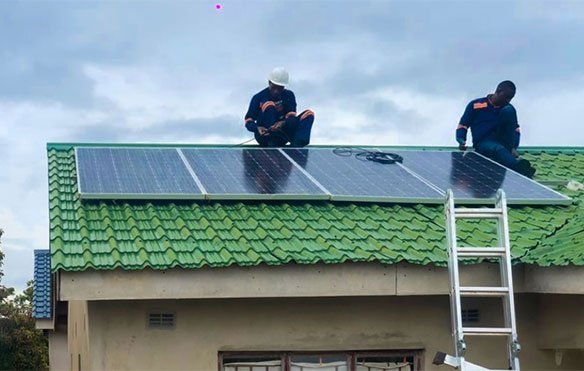Africa’s power is getting cheaper as renewables take over. From solar mini-grids to wind farms, falling energy costs are lighting up homes, cutting bills, and driving growth though financing hurdles remain.
Electricity is becoming more affordable across Africa as renewable energy reshapes the continent’s power landscape. From large-scale solar and wind farms to off-grid mini-grids and home systems, falling generation costs are translating into lower tariffs and wider access, particularly in rural communities that have long been excluded from reliable energy supply. A recent report by the International Renewable Energy Agency (IRENA) confirms this shift, showing that in 2024 solar photovoltaics were on average 41 percent cheaper and onshore wind 53 percent cheaper than the lowest-cost fossil fuel options. Globally, 91 percent of new renewable projects are now more affordable than fossil fuel-based alternatives, a trend that is reshaping energy access across Africa.
Over the past decade, the cost of utility-scale solar installations in Africa has dropped by 68 percent, with average installed costs falling from over US$3,400 per kilowatt in 2015 to just over US$1,000 in 2024. This has pushed the price of solar electricity down to US$0.074 per kilowatt-hour, almost on par with global markets. Onshore wind projects have seen similar progress, with costs declining by more than a third since 2010. These changes are having real impact across the continent. In countries such as Kenya, South Africa, Morocco and Egypt, large-scale renewable projects have reduced dependence on costly fuel imports and stabilized energy pricing. In Nigeria and other countries, rural communities that once relied on diesel generators or kerosene lamps are increasingly turning to solar mini-grids and solar kits, which can reduce electricity costs by up to 60 percent while offering greater reliability.
The benefits are already visible in daily life. Families are saving money on household energy, small shops can stay open longer, and students have more hours of light to study. In agriculture, solar irrigation and cold storage are improving productivity and reducing post-harvest losses, helping farmers preserve their produce and earn more. According to energy associations, households replacing kerosene with solar lighting can cut their lighting bills by more than 70 percent, freeing income for food, education, or savings. On a broader scale, research by IRENA and the African Development Bank suggests that a full-scale shift to renewable energy could boost Africa’s GDP by more than six percent.
Despite this momentum, challenges remain. Financing remains the greatest hurdle, with the cost of capital for African renewable projects averaging around 12 percent, nearly three times higher than in Europe. This imbalance forces African developers to pay more for the same projects, pushing tariffs upward despite falling equipment costs. Grid infrastructure is another pressing constraint, as many national networks lack the capacity to absorb new renewable power without significant investment. In some fragile states, the poorest communities may still be left behind unless concessional financing, subsidies, or innovative public-private partnerships are put in place.
Even so, technological advances are offering new opportunities. Battery storage costs have dropped by more than 90 percent since 2010, making it easier to store solar and wind power for evening use or backup, especially in off-grid areas. Hybrid systems combining solar, wind, storage, and digital tools are increasingly being deployed to strengthen reliability. Major projects such as South Africa’s Red Sands battery storage facility signal the scale of what is possible as Africa positions itself to take advantage of its abundant renewable resources.
With some of the world’s richest solar and wind potential, Africa is not only adopting clean energy but also shaping how affordable electricity can be delivered in low-income contexts. As costs continue to fall and innovation accelerates, millions more Africans are expected to gain access to reliable and affordable power, fueling education, business growth, and economic development across the continent.
